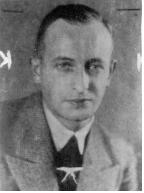![]()
Adolf Eichmann was born on March 6, 1906 in Solingen Germany he has a sister and five brothers. He grew up in Linz Austria which was Hitler's home town. And his classmates teased him about his look and called him ''little Jew.'' He dropped out of high school and he became a traveling sales man. Accepted into an S.S brigade comprised of Austrians. Soon there after, Eichmann was invited to join the S.D. the S.S security service, and given the rank the sergeant. In 1935 he was assigned to the Jewish department of the S.D. and worked his way to the top.

He taught himself Hebrew and Yiddish. He studied the Jews, gathering information about their leaders, synagogues, businesses, culture. Eichmann married Vera Leibl, a native of Bohemia in 1936 and lived with her in Prague. He eventually became the father of four children, all boy's. In 1932 at age 26 he joined the growing Austrian Nazi party at the suggestion of his friend Ernst Kalten Brunner. Eichmann then became a member of the S.S in 1934 served as an S.S corporal at Dachau concentration camp. In September 1934 Eichmann found relief from the monotony of that assignment by getting a job in Heydrich's SD, the powerful SS security service, Eichmann started out as a filing clerk cataloging information about freemason's. He was then assigned to the Jewish selection which was busy collecting information on all prominent Jews. This marked the beginning of Eichmann's interest in the Jews. He studied all aspects of Jewish meetings and often visited Jewish sections of cities while taking volumes of notes. He became familiar with the issue of Zionism. He gradually became the acknowledged 'Jewish specialties', realizing this could have positive implications for his career in the S.S. He soon attracted the attention of Heydrich and the S.S Reich's fuhrer Himmler who appointed Eichmann to head a newly created SD scientific museum of Jewish affairs.